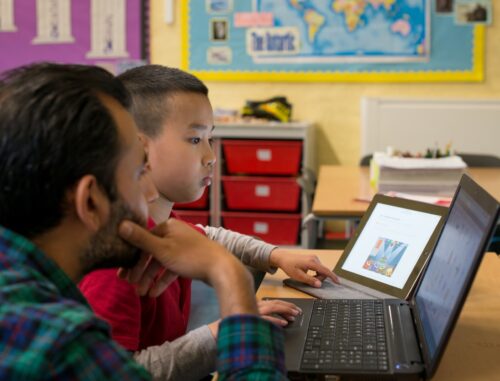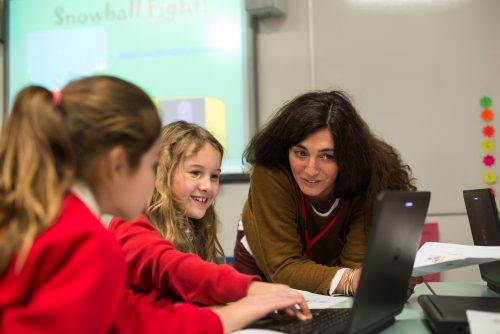Over the last 20 years, researchers and educators have increasingly aimed to develop computing curricula that are culturally responsive and relevant. Designing equitable and authentic learning experiences in computing requires conscious effort to take into account the characteristics of learners and their social environments, in order to address topics that are relevant to a diverse range of students. We previously discussed this topic in a research seminar where the invited speakers shared their work on equity-focused teaching of computer science in relation to race and ethnicity.

Culturally relevant teaching in the classroom demonstrates a teacher’s deliberate and explicit acknowledgment that they value all students and expect all students will excel. Much of the research on this topic stems from the USA. In the UK, it may be that a lack of cultural responsiveness in the computing curriculum is contributing to the underrepresentation of students from some ethnic backgrounds in formal computing qualifications [1] by negatively affecting the way these young people engage with and learn the subject.
Guidelines for creating culturally relevant learning resources for computing
Addressing this issue of underrepresentation is important to us, so we’re making it part of our work on diversity and inclusion in computing education. That’s why we’re delighted to have received an ACM SIGCSE Special Project Award for a project called ‘Developing criteria for K-12 learning resources in computer science that challenge stereotypes and promote diversity’. Our overarching aim for this project, as with all our work at the Raspberry Pi Foundation, is to broaden participation in computing and address the needs of diverse learners. Through this project, we will support computing educators in understanding culturally responsive pedagogy and how to apply it to their own practice. To this end, we’ve set up a working group that will use research into culturally responsive pedagogy to develop a set of guidelines for creating culturally relevant learning resources for computing. Our primary audience for these guidelines are teachers in the UK, but we are confident the project’s results will have value and application all over the world.
There is increasing awareness across all education, and in computing education in particular, that culturally responsive approaches to curriculum and teaching fosters relevancy, interest, and engagement for student learners. This exciting effort brings together computing classroom teachers and education researchers to identify approaches and resources that England’s educators can leverage to enact culturally responsive approaches to teaching computing.
Joanna Goode, Sommerville Knight Professor at the University of Oregon, member of our Special Project working group
What do we mean by culturally relevant resources?
A learning resource obviously has learning objectives, but it is also always set in a particular context, which may or may not be relevant to young people. It may contain images, video, and other media assets in addition to text. Presenting computing stereotypes, for example in the media assets and language used, or situating resources in an unfamiliar context can cause learners to feel that they do not belong in the subject or that it is not relevant to them and their life. On the other hand, providing resources that allow learners to relate what they are learning to issues or tasks that are personally meaningful to them and/or their culture or community can be empowering and engaging for them. For example, a common scenario used to introduce basic algorithm design to young people is making a cup of tea, but tea preparation and drinking may be culturally specific, and even if tea is drunk in a young person’s home, tea preparation may not be an activity they engage in.

Ensuring that a more diverse group of young people feel like they belong in computing
The expected long-term outcome of this project is to remove significant obstacles to young people’s participation in computing by ensuring that a more diverse group of young people feel represented and like they belong in the subject. The working group we have established consists of seven practising computing teachers from a diverse range of UK schools and a panel of four experts and academics (Lynda Chinaka, Mike Deutsch, Joanna Goode, and Yota Dimitriadi) working with young people and their teachers in the UK, USA, and Canada.

Yota Dimitriadi, Associate Professor at the University of Reading and a member of the expert panel, says: “I am delighted to participate in this project that enables conversations and positive action around inclusive and intersectional computing practices. It is more important than ever to enhance a global perspective in our curriculum planning and further our understanding of culturally responsive pedagogies; such an approach can empower all our students and support their skills and understanding of the integral role that computing can play in promoting social justice.”
Such an approach can empower all our students and support their skills and understanding of the integral role that computing can play in promoting social justice.
Yota Dimitriadi, Associate Professor at the University of Reading, member of our Special Project working group
The group has started to meet and discuss the guidelines, and we aim to share early findings and outputs in the summer months. We’re very excited about this project, and we think it is an important starting point for other work. We look forward to updating you in the summer!
[1] Students of Black, non-Chinese Asian, and Mixed ethnicities; Kemp, P.E.J., Berry, M.G., & Wong, B. (2018). The Roehampton Annual Computing Education Report: Data from 2017. University of Roehampton, London.
Website: LINK
